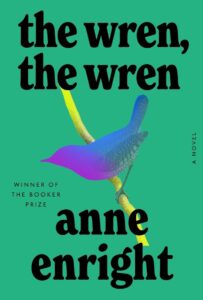
Anne Enright Stays Inside the Work
The Author of The Wren, The Wren Takes the Lit Hub Questionnaire
What time of day do you write (and why)?
Any time of day. All the time. Because I have to. Because I like it.
How do you tackle writers block?
‘Tackle’ and ‘block’ are very mechanical words: they conjure up hoist, a pulley, a crowbar you might use to shift some big, hard lump of psychic darkness that squats between you and your next sentence. What exactly is a block? Is it a wall you can’t see over? Or is it some kind of internal difficulty, like an intestinal event?
Here’s the thing: there is no wall. You made the wall up. I usually think it is good to name a problem because a name makes it easier to fix, but to call a difficulty a block is to imagine an obstacle into existence—and why do that to yourself, when you could imagine your story instead?
The way to tackle writer’s block is to not believe it exists. If you run out of steam on something, switch to something else and come back later. Also, I don’t get writers block because I am not writing—I am just typing, thinking, pushing into something to see what’s there.
I never sit down to produce a novel. I work a line or two, redraft endlessly, improvise. I spend a year or more in this creative state of uncertainty, and one day, I seem to know what I am doing. The book makes itself known to me. After this, my job is to shape it, and bring it to its best self.
Don’t worry, there are slow weeks and slow months, there are days when I read my once-glowing pages and find them turned to ashes. It can be a reach. I regularly find myself in a sea of words that I have to rewrite and rearrange, so I can see where the hell I am going now. I don’t call this ‘writer’s block’, I call it ’Monday morning.’ It is the place where I live.
What is the enemy of reverie? Do you feel empty, or do you feel threatened? These are the kinds of question I ask my writing students when they talk about ‘block’. I am interested in the difference between a sense of inside and outside. Where does the story come ‘from’, where does the difficulty come ‘from’ – it is usually not the same place. A student might believe that inspiration is ‘out there’ and wait for it to arrive, or they might need external validation for a story that comes from the heart. These outside things feel huge and beyond your control, but they are actually in your head (you fool!), made you made them up. The boring fact is that, more often than not, ‘stuck’ writers are just wrestling with issues of craft.
I don’t call it ‘writer’s block’, I call it ’Monday morning.’ It is the place where I live.
For me, the answer to any writing problem is right there on the page. Stay inside the work. If you keep close to your sentences, to the sweetness of getting them right, then you will be interested, you will be safe in your imagining, and the words will flow.
What’s the best or worst writing advice you’ve ever received?
The first time I met Margaret Atwood was 22 years ago. We spoke for about 5 minutes and everything she said was pithily brilliant. My best take-away was the simple truism: “Not everyone is going to like your book.” This may seem obvious, but it punctured a slight insanity I did not know I suffered from. Because in some murky recess of my creative being I believed that everyone had to like my book and if they didn’t it, was because they were stupid and nasty and also hated me. This infantile way of thinking might get you through three or four focused years working on a manuscript (or ten, or fifteen) but it really will not get you through life. Write like a demon – please do! – but publish like an adult, if you can.
Which of your characters is your favorite?
I worked with the character of Carmel in The Wren, The Wren for a long time and did not know where to take her until, almost on a whim, I made her pregnant. That baby was Nell and, once she arrived, the book came with her. Everything made sense. Nell was so much fun to write. I think I invented her just to be loved, I think that is why she is there.
Name a classic you feel guilty about never having read (why)?
I think I feel guilty that I never took to nineteenth century British writers; it was such a golden age for the novel. Is that prejudice? I cannot be sure. I don’t talk about it much—it is such a blasphemy to say that Austen is fine but give me Flaubert, that I abandoned Vanity Fair for Moby Dick, that when I was young and impressionable it was Dostoevsky over Dickens, every time.
I read most of the classics in my teens and twenties and I now have a tiny regret that I read them so young. I will never sit down and read Joyce or Proust for the first time, and in the fulness of my adult understanding. If I do pick them up, however, I am stunned at how well they could write. This sounds like a silly thing to say, but thirty or forty years on, I know how difficult that is to do.
__________________________

Anne Enright’s The Wren, The Wren is available from W.W. Norton & Company.
Anne Enright
Anne Enright is author of seven novels, most recently [em]The Wren, the wren.[/em] She has been awarded the Man Booker Prize, the Andrew Carnegie Medal for Excellence in Fiction, and a Lifetime Achievement Award from the Irish Book Awards. She lives in Dublin.



















